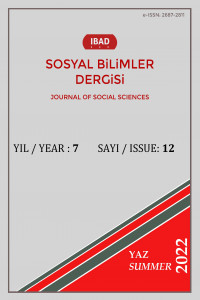Öz
Evelyn Waugh’s Black Mischief (1932) has been accepted as one of the satiric novels of the 20th century English literature. Being Waugh’s third novel, Black Mischief includes a high concentration of satire and criticism through which the writer expresses his ideas on colonialism and the modern man in general. The novel is about an unsuccessful attempt at establishing a country in the heart of the oriental world. Seth, the Oxford-graduate emperor of a fictional Azania, fails to establish a correlation between the English-like Azania in his aspirations with the real cannibal-oriented country and its half-naked inhabitants. This study will analyze Waugh’s Black Mischief in terms of Frantz Fanon’s essay “On National Culture” (1959). A political philosopher and an intellectual from Martinique, Frantz Fanon has become highly influential in the discourse on colonialism and post-colonialism. His writing titled “On National Culture” outlines the steps to embrace the notion of national identity and national consciousness. This study will outline to what degree Waugh’s protagonist Seth fits into Fanon’s category of an endeavor to establish national culture. The study will conclude that Seth’s failure to establish his country heavily depends on the contemporary human conditions in the psychologically devastated universe.
Anahtar Kelimeler
Kaynakça
- Baysal, K. (2013). Re-Presenting the History of the Margin: Things Fall Apart. The Criterion An International Journal in English, 4(III), 1-5.
- Beaty, F. L. (1992). Black Mischief. In The Ironic World of Evelyn Waugh: A Study of Eight Novels (pp. 67-83). DeKalb: Northern Illinois University Press.
- Bhabha, H. K. (2004). Of Mimicry and Man. In The Location of Culture (pp. 121-131). London: Routledge.
- Clement, A. (1994). An Active but Still Undefined Quest: Black Mischief. In The Novels of Evelyn Waugh: A Study in the Quest-Motif (pp. 67-91). New Delhi: Prestige.
- Crabbe, K. W. (1988). Innocents at Home. In Evelyn Waugh (pp. 46-58). New York: Continuum.
- Çetiner, N. (2020). Morgan Llywelyn’s Celtic Identity and the Celtic Folklore in The Elementals. The Journal of Social Sciences, 7(49), 515-530.
- Erdem A. N. (2015). An Orientalist Reading of Kipling’s ‘The Return of Imray’ and ‘The Mark of the Beast.’ Atılım Sosyal Bilimler Dergisi, 5(1), 34-54.
- Fanon, F. (1968). On National Culture. In The Wretched of the Earth (pp. 206-248). New York: Grove Press.
- Garnett, R. R. (1990). Black Mischief: ‘Sunless, Forbidden Places’. In From Crimes to Brideshead: The Early Novels of Evelyn Waugh (pp. 76-97). London: Bucknell University Press.
- Kaya, H. (2019). Two Literary Reactions in the Romantic Period: Romantic Anti-Slavery Idea and Romantic Orientalism in Selected English Romantic Poems. Agathos, 10/1(18), 91-105.
- Myers, W. (1991). Barbarians: Black Mischief, A Handful of Dust and Scoop. In Evelyn Waugh and the Problem of Evil (pp. 21-51). London: Faber and Faber.
- Waugh, E. (2000). Black Mischief. London: Penguin.
Öz
Evelyn Waugh’ın Kara Şeytan (1932) adlı romanı 20. yüzyıl İngiliz edebiyatının hiciv romanlarından biri olarak sayılır. Waugh’ın üçüncü romanı olan Kara Şeytan, yazarın sömürgecilik ve genel anlamda modern insan ile ilgili düşüncelerini ve eleştirilerini hiciv diliyle sunmaktadır. Romanda Oxford Üniversitesi mezunu olan Seth, Azania adındaki kurgusal ülkesinde hayallerindeki İngiltere benzeri bir ülkeyi kurmaya çalışırken, gerçekleri yok saymıştır. Bu çalışma, Waugh’ın Kara Şeytan adlı romanını Frantz Fanon’un “Ulusal Kültür Üzerine” adlı eseri göz önünde bulundurularak inceleyecektir. Martinik asıllı siyasi filozof ve aydın olan Frantz Fanon’un eserleri sömürge dönemi ve sömürgecilik sonrası alanında etkileyici ve aydınlatıcı çalışmalar olarak kabul edilmektedir. Bu çalışma, Waugh’ın romanındaki Seth adlı kahramanın, Fanon’un ulusal kültür oluşturma çabasına ne derece uygun olduğunu irdelemektedir. Sonuç olarak, Seth’in hayalindeki ülkesini oluşturmada başarısızlığı aynı zamanda psikolojik açıdan çökmüş bir dünyanın dönem koşullarına bağlı olduğu işlenmektedir.
Anahtar Kelimeler
Kaynakça
- Baysal, K. (2013). Re-Presenting the History of the Margin: Things Fall Apart. The Criterion An International Journal in English, 4(III), 1-5.
- Beaty, F. L. (1992). Black Mischief. In The Ironic World of Evelyn Waugh: A Study of Eight Novels (pp. 67-83). DeKalb: Northern Illinois University Press.
- Bhabha, H. K. (2004). Of Mimicry and Man. In The Location of Culture (pp. 121-131). London: Routledge.
- Clement, A. (1994). An Active but Still Undefined Quest: Black Mischief. In The Novels of Evelyn Waugh: A Study in the Quest-Motif (pp. 67-91). New Delhi: Prestige.
- Crabbe, K. W. (1988). Innocents at Home. In Evelyn Waugh (pp. 46-58). New York: Continuum.
- Çetiner, N. (2020). Morgan Llywelyn’s Celtic Identity and the Celtic Folklore in The Elementals. The Journal of Social Sciences, 7(49), 515-530.
- Erdem A. N. (2015). An Orientalist Reading of Kipling’s ‘The Return of Imray’ and ‘The Mark of the Beast.’ Atılım Sosyal Bilimler Dergisi, 5(1), 34-54.
- Fanon, F. (1968). On National Culture. In The Wretched of the Earth (pp. 206-248). New York: Grove Press.
- Garnett, R. R. (1990). Black Mischief: ‘Sunless, Forbidden Places’. In From Crimes to Brideshead: The Early Novels of Evelyn Waugh (pp. 76-97). London: Bucknell University Press.
- Kaya, H. (2019). Two Literary Reactions in the Romantic Period: Romantic Anti-Slavery Idea and Romantic Orientalism in Selected English Romantic Poems. Agathos, 10/1(18), 91-105.
- Myers, W. (1991). Barbarians: Black Mischief, A Handful of Dust and Scoop. In Evelyn Waugh and the Problem of Evil (pp. 21-51). London: Faber and Faber.
- Waugh, E. (2000). Black Mischief. London: Penguin.
Ayrıntılar
| Birincil Dil | İngilizce |
|---|---|
| Bölüm | Araştırma Makaleleri |
| Yazarlar | |
| Yayımlanma Tarihi | 2 Ağustos 2022 |
| Kabul Tarihi | 30 Ağustos 2021 |
| Yayımlandığı Sayı | Yıl 2022 Sayı: 12 |
This journal is a member of and subscribes to the principles of the Committee on Publication Ethics. |
IBAD Sosyal Bilimler Dergisi I (online) ISSN 2687-2811


